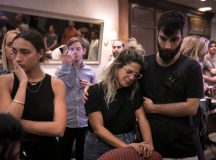Paul Frosh is a Professor in the Department of Communication and Journalism at The Hebrew University of Jerusalem. This open letter was first published on his Facebook page on 20 October.
A letter signed by UK academics in my field (media and communications studies), some of whom I know well, was released to the public on Thursday October 19th. The letter barely mentions Hamas and almost completely ignores their mass slaughter of Israelis.
Here is my response:
Dear Signatories,
Thank you for providing a moment of moral clarity in the letter you have signed.
Let’s begin with the name of the letter: ‘Letter by media & communications scholars on British news media coverage of the war in Gaza’. But the war is not only in Gaza: it extends far beyond it. It began in fact in southern Israel, with Hamas’ slaughter – its pogrom – against Jewish and non-Jewish civilians. Whole communities were destroyed. And it is still going on in Israel, with missile attacks from Gaza across the whole of the south and centre of the country, and in the north, where Hezbollah has not ceased to launch its missiles against us from Lebanon, escalating every day. The very framing of your letter situates your concern and solidarity with only one population, in only one place, and utterly erases the lives, losses, and wounds of Israelis and Jews. Unsurprisingly, given this framing, which excludes in advance any mention of the war ‘in Israel’, you fail to mention the murder of Israeli civilians, except with one throwaway phrase buried midway through the letter – that Israeli civilian victims are ‘rightfully mourned’. One cannot help wondering whether this phrase was included in the letter as a fig-leaf, an insurance policy should someone take offence at the fact that you have neglected to mention Hamas’ ongoing attacks on Israel, and its mass slaughter of Jews.
Your letter focuses on the perceived (‘noted’ in your words), but not demonstrated, bias of British news media against the Palestinians, and the rhetoric used against them. I have heard Hamas, not the Palestinians, being called ‘barbaric’ – a description which is more than earned by Hamas’ actions. But as concerned ‘scholars of journalism, media and communications’, you will surely not have failed to notice how Hamas’ pogrom was produced and circulated by them as an ongoing celebratory media event, a social media snuff-movie, and how Hamas’ more recent broadcasts of Jewish civilian hostages are exploitative pieces of audio-visual theatre designed to further terrorize the loved ones of those kidnapped. Yet, this is also excluded from your letter – even though much of it is indeed currently happening ‘in’ Gaza. Somehow, this does not provoke your ire, does not elicit outraged instructions to British news organizations on how reduce the harm intended by these videos when they re-broadcast them. Where is your ‘shock and dismay’, whether as media and communication scholars or as human beings, at a deliberate media policy designed explicitly to terrorize Jews?
The exclusions, absences, and unsubstantiated claims of this letter make it abundantly clear that in public, at least, moral concern and moral outrage do not extend to the Jewish victims of the Hamas pogrom, or to their ongoing torture via media.
Crucially, your exclusion of Jewish deaths contrasts with voices among Palestinians who have publicly denounced Hamas, its antisemitic ideology and the horrific pogrom it executed. In contrast to the metaphor of ‘resistance’ that denies Palestinians moral agency by treating them as a stimulus-response machine, where everything they might do is pre-determined (and therefore legitimated, made ‘understandable’) by decades of Israeli occupation, these Palestinians prove that it is possible to identify fully with Palestinian national aspirations for independence and freedom from occupation, while unequivocally taking a moral stand against the barbarism of Hamas. Signatories to this letter – all of you: their stand shames you forever.
Finally, a personal note. Some of you are well known scholars of media and ethical response. You write urgent, impassioned, influential work on media, compassion, morality, justice. Some of you were also personal friends and have even written to me privately in the last week or so to see how I am and to say that I am in your thoughts. But care and solidarity are tested not only through the private expression of concern, important though that is, but through unequivocal public demonstration. I will not say that I am disappointed at your failure to show public concern. It goes far, far deeper than that: it is existential. You have visibly excluded me, my family, my people from your moral calculus, from public grievability. Your universalism is a universalism of fools: a universalism in which Jews, even dead ones, don’t really count. Something has snapped: an uncrossable line has been drawn between us. It is a critical, devastating, failure of moral courage.
Paul Frosh
Department of Communication and Journalism
The Hebrew University of Jerusalem
20 October 2023




































